#tsar alexander 1
Explore tagged Tumblr posts
Text
SAINT HELENA LITTLE ISLAND by M. A. ALDANOV -
The book contains moderately fictionalized factual material about the stay of the Russian commissioner Count Balmain on the island of Saint Helena.
---------------------------------
The first letter was from London from his former colleague, Krivtsev. He had just returned from Russia, and gave de Balmain all sorts of news.
“…Louisa” is living, as formerly, with Naryshkina, or more properly speaking, such reports are circulated. The court physician Wylie is of another opinion, however, and asserts that “Louisa,” as always, overestimates his powers. With whom Naryshkina is unfaithful to “Louisa” is not known, but it is certainly not Gagarin.”
(The Emperor Alexander was known to the diplomatists under the name of “Louisa,” which had been the code name employed for him in the ciphered correspondence between Nesselrode and Speransky.)
-----------------------------------
The issue is touched upon very delicately. It’s known that Dr. Wylie recorded a complete diagnosis of Alexander's sexual health - let’s hope it will be published some day. It's also no secret that Nicholas I burned tons of papers compromising Alexander, including Maria Fyodorovna’s scandalous diaries (as well as Napoleon III cleansed archival documentation of unwanted papers left behind by Napoleon I)
Alexander's charming, alluring femininity was described many times by different eyewitnesses and repeated by historians. In my opinion, Emil Ludwig has wonderfully summarized the essence of the relationship between Napoleon and Alexander.
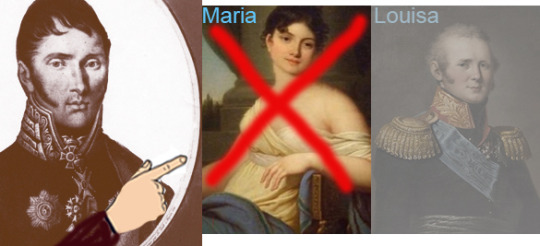
45 notes
·
View notes
Text
he’s so pretty
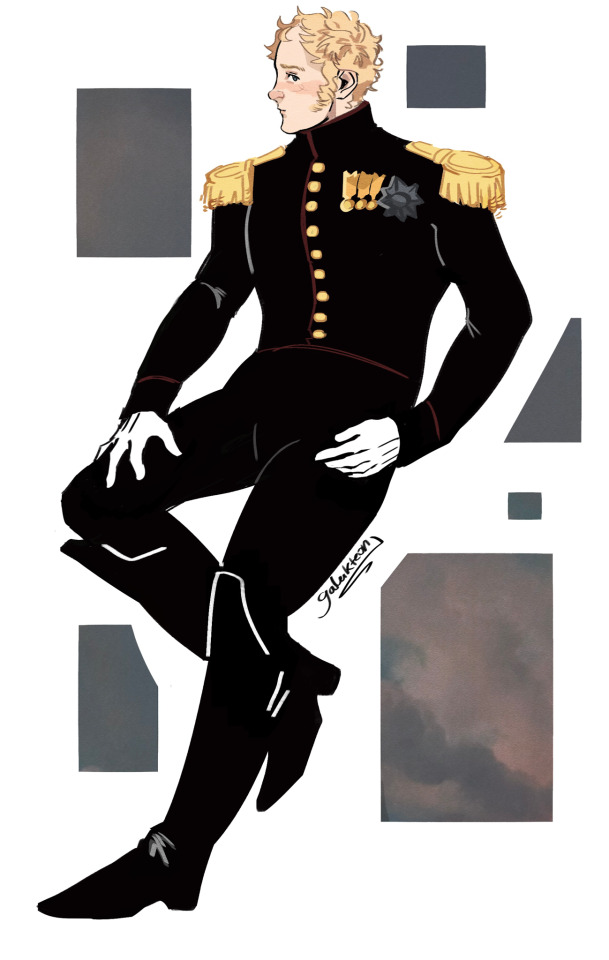
redrew an old piece, experimenting with style for fun
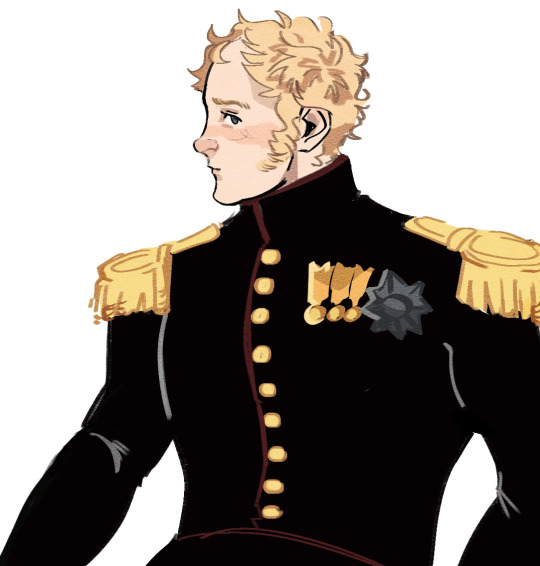
286 notes
·
View notes
Text
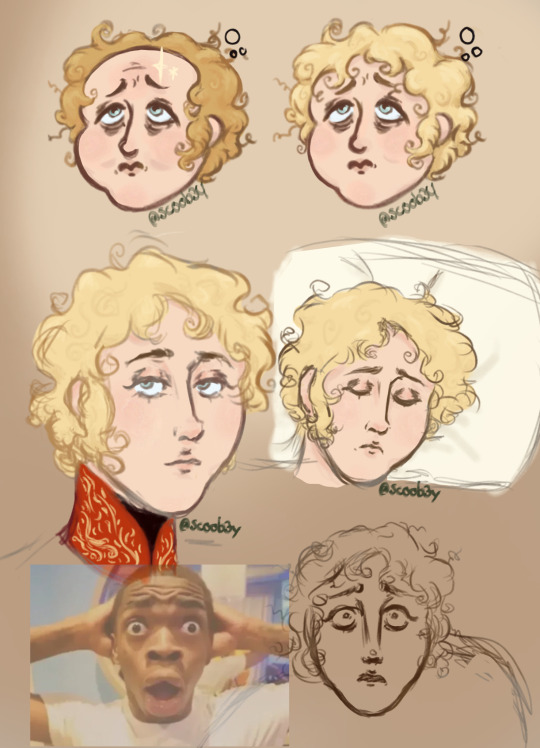
Kinda went insane-
Anyways here’s a Russian twink
#tsar alexander i#napoleon#napoleonic era#alexander i of russia#Alexander1#1 like and I’ll draw Napoleon taking it-#Napoleonic#napoleonic wars#napoleonic shitpost
129 notes
·
View notes
Text
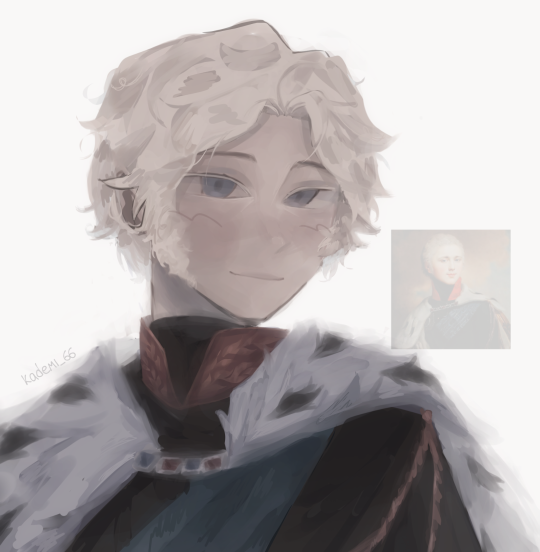
Твинк какойта яхз
#art#alexander 1#my art#history#александр 1#арт#napoleonic wars#napoleonic era#Alexander i#tsar alexander i#alexander the first#napoleon#alexander i#alexander i of russia
54 notes
·
View notes
Text
porcelain tsar^_^

#alexander1#napoleon#napoleonic wars#tsar alexander i#alexander i of russia#alexander 1 of russia#napoleonic era#napoleonic shitpost#napoleonic
136 notes
·
View notes
Text
If twitter existed in the Napoleonic Era
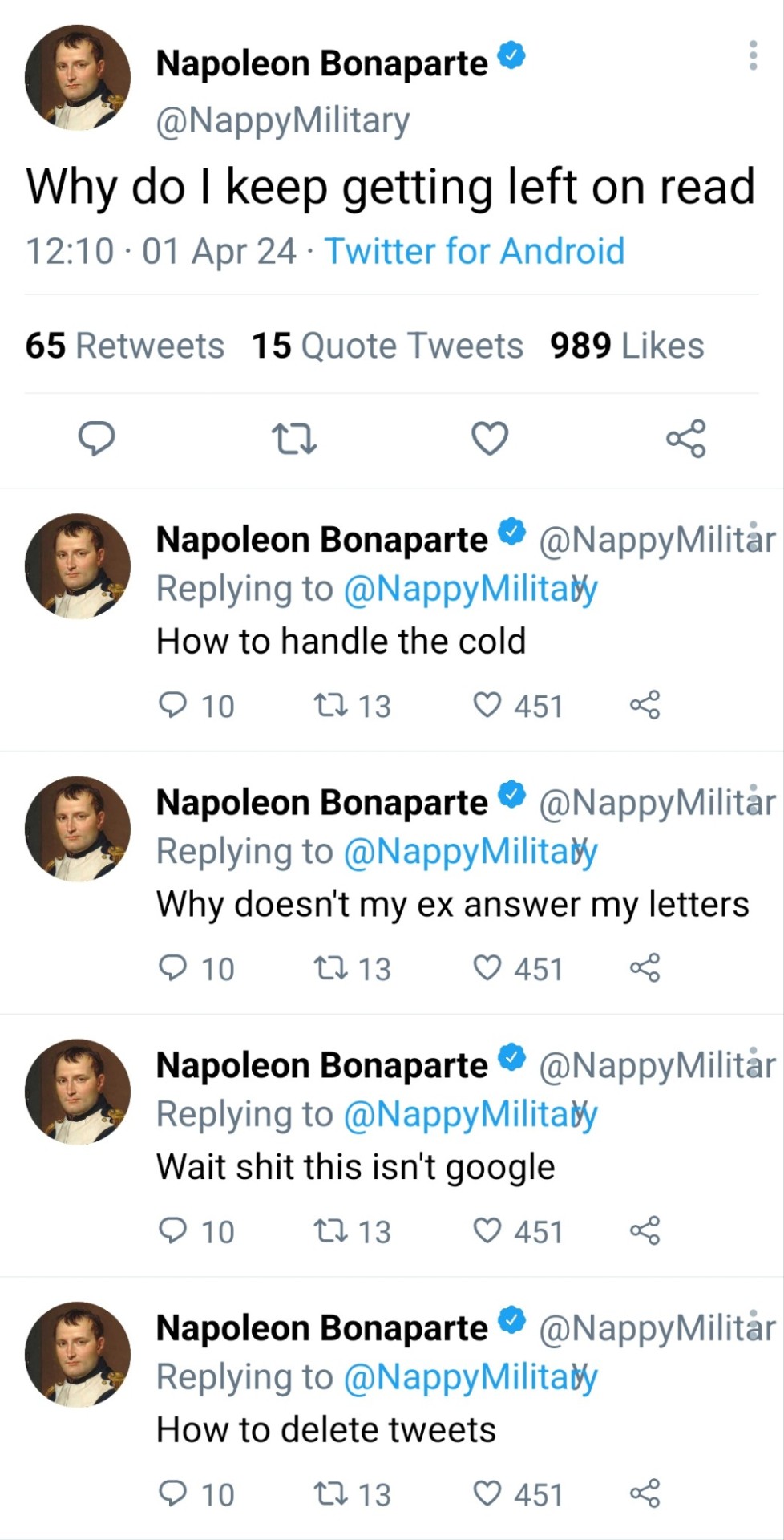


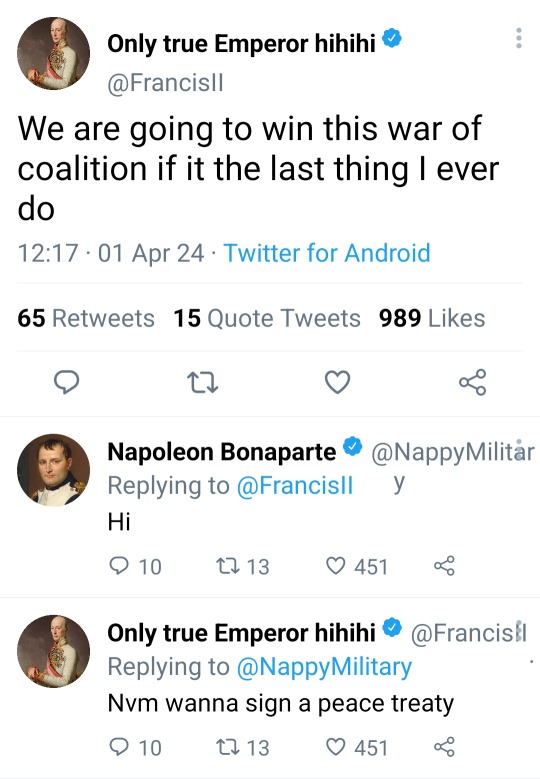

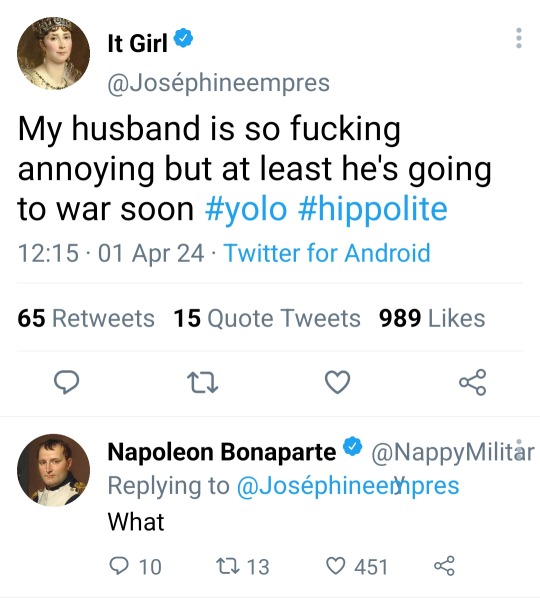
#idk why I made these#history#history fandom#french revolution#napoleon bonaparte#napoleon#robespierre#maximilien robespierre#tsar alexander i#francis II#murat#joachim murat#josephine de beauharnais#fake tweets#napoleonic memes#napoleonic era#napoleonic wars#napoleonic shitpost#happy 1 of april btw
171 notes
·
View notes
Text
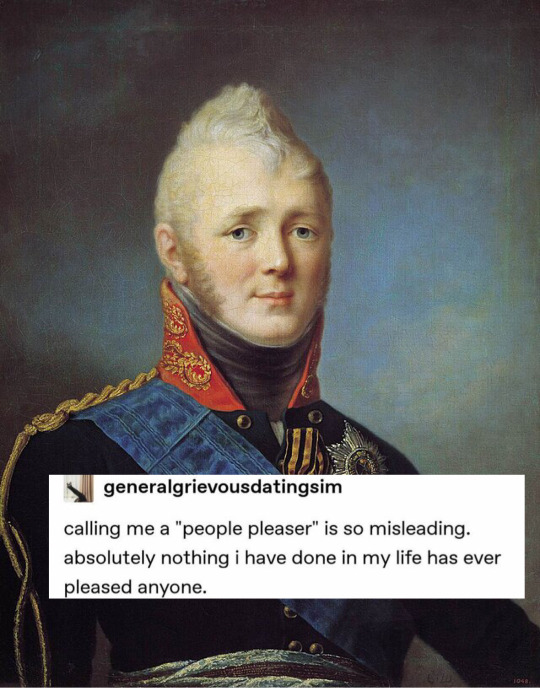
#well he tried#alexander i of russia#tsar alexander i#alexander is always like if even 1 person dislikes something I did I will cry#like babygirl you’re so unsuited to rule it’s hilarious#napoleonic wars#history memes
70 notes
·
View notes
Text
NapAlex and DavisCrawford




Anybody see my vision...
#Toxic yuri vs toxic yaoi#Im not sure about the roles..#I based this upon looks#Maybe im just deluding myself because i made one fanart of Napalex as DavisCrawford...#Anyways died 1825 born 1908 welcome back Tsar Alexander I#joan crawford#bette davis#napoleonic era#napoleonic tumblr#napoleon bonaparte#napoleon#napoleon bonaparta#napoleonic wars#napoleonic shitpost#tsar alexander i#alexander i of russia#alexander1#alexander 1 of russia#toxic yuri#old hollywood yuri#old hollywood#1930s cinema#1930s actresses#1940s actress#1940s cinema#pompomkisasszonyka
5 notes
·
View notes
Text
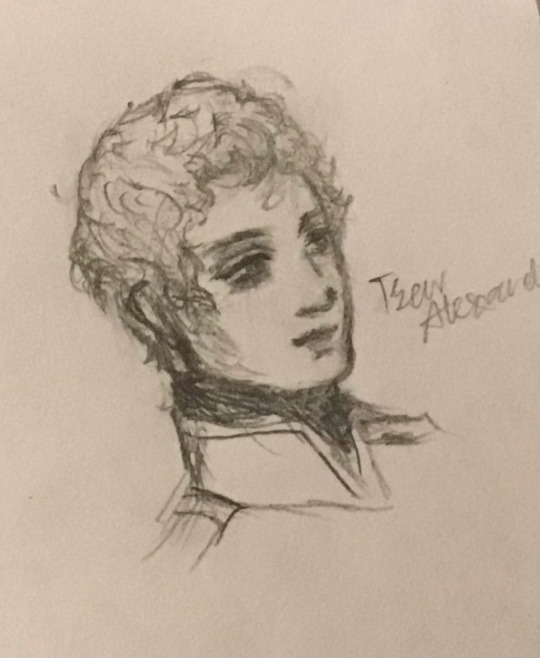
tsar alexander 1 doodle
drew this in class bc i was bored and tired loll
#artwork#napoleonic era#tsar alexander i#napoleon bonaparte#napoleonic shitpost#art#alexander i of russia
59 notes
·
View notes
Text
Alexander in the Soviet animation Левша 1964 (Lefty). Love him so much, a very realistic image actually )) )
9 notes
·
View notes
Photo

Tsar Nicholas II: Last of the Romanovs
Tsar Nicholas II (reign 1894-1917) was the last of the Romanov emperors, murdered along with his family during the turmoil of the Russian Revolution in 1917. Insisting on maintaining as far as possible the autocratic rule begun by his ancestors, Nicholas failed to address the grievances of his subjects, and with him fell the Russian Empire.
Only just surviving the Russian Revolution of 1905, Nicholas refused to heed the warning signs of a state-wide uprising that involved disgruntled peasantry, ignored workers, the disenchanted middle classes, and reform-seeking liberals. The tsar's legitimacy to rule was further brought into question following unsavoury and persistent rumours about just how much influence the odd self-proclaimed holy man Grigori Rasputin (1869-1916) had on the royal family and politics, and by the tsar's unwise decision to take personal command of the army in the disastrous First World War (1914-18). Obliged to abdicate, the tsar and his family were shot on the orders of the Bolshevik revolutionary and leader of Soviet Russia, Vladimir Lenin (1870-1924), in case he became a rallying point for pro-royalists during the Russian Civil War (1917-22).
Early Life & Family
Nicholas Alexandrovich Romanov was born on 18 May 1868 in Saint Petersburg. He was born into the Romanov family, which had ruled Russia since 1613. Nicholas was the eldest son of Tsar Alexander III (reign 1881-1894), and so he became the tsarevich or heir to the throne. His doting mother was Empress Maria Feodorovna, the daughter of King Christian IX of Denmark (reign 1863-1906). Nicholas had two younger brothers and two younger sisters. The heir studied a variety of subjects in the Law Faculty of the University of St. Petersburg from 1885 to 1890. In preparation for his reign, Nicholas also spent several years in the army, was educated in religious matters, served on his father's council of ministers, and undertook several tours of the Near East and Asia in 1890 and 1891. Nicholas, like his father, "lived and breathed complacent extreme conservatism" (Service, 9).
Nicholas II became tsar in 1894, following the death of his father on 1 November. His coronation was held on 26 May 1896. The role of tsar (sometimes spelt czar) was one of absolute monarch, and Alexander had played it to the full. Some hoped that Nicholas might be less of an authoritarian, but this was not to be. The new tsar quickly dismissed calls for constitutional change as "senseless dreams" (Brown, 93). Nicholas controlled quite literally every aspect of his subjects' lives, and in return, his people were given his devotion to duty, family devotion, and religious piety. The bond between monarch and subject was regularly reinforced by such community appearances as Easter celebrations and other public rituals involving pomp and circumstance. There was, too, an overwhelming emphasis given to the superiority of Russian subjects compared to non-Russians, of whom there were millions within the Russian Empire. This was a deep flaw in Nicholas' approach to rule, but not as catastrophic a flaw as the one which would ultimately bring his downfall. In Nicholas' world, the tsar simply was the state, but if, for whatever reason, the people (from aristocrats to the lowliest peasants) lost faith in the tsar, then they also lost faith in the state, which could, and actually did, open up the possibility of a regime-changing revolution.
Nicholas married the German princess Alexandra Feodorovna (1872-1918) on 26 November 1884, her title prior to the marriage being Princess Alix of Hesse-Darmstadt. Alexandra was a granddaughter of Queen Victoria (reign 1837-1901). The couple had met when Alexandra, then just 12 years old (and Nicholas was 16), visited Russia for the wedding of her sister to Nicholas' uncle. The couple were attracted to each other, and the young prince gave Alexandra a memento brooch. Next meeting five years later, Nicholas and Alexandra danced, dined, and skated together, and the relationship blossomed. The couple would have four daughters, Olga (born 1895), Tatiana (born 1897), Maria (born 1899), and Anastasia (born 1901), and one son, Alexei (born 1904).
Read More
⇒ Tsar Nicholas II: Last of the Romanovs
50 notes
·
View notes
Text
I Feel Like I Win When I Lose
On April 6, 1974, ABBA won the Eurovision Song Contest with "Waterloo." The song transformed Napoleon's last defeat into a metaphor for surrender.
It's paradoxical. But perhaps it was exactly right. In surrender, ABBA found a vision for a Europe that had found union in defeat.
I.
Before he met his destiny, Napoleon developed his own vision of European unity.
Napoleon's Continental System envisioned a Europe unified through its insulation from British trade. But for Napoleon, the System was always an exercise in command and control.
In his Berlin Decree of November 21, 1806, Napoleon declared Britain under a state of blockade. All commerce with Britain was prohibited. All British goods were to be seized.
The System would unite Europe through the force of that command. It was a vision of a Europe bound by imperial will, through a decree “[f]rom our Imperial Camp at Berlin.”
In two more decrees, issued November 23 and December 17, 1807, the Emperor expanded the regime into a system inspections, confiscations, and certificates of origin.
The last decree the Emperor handed to his foreign minister, with instructions to carry it to the Netherlands, Spain, and Denmark, so these nominal sovereigns could execute it as written.
II.
Napoleon was defeated at Waterloo. His System had been defeated long before that.
At Tilsit in July 1807, Napoleon secured the consent of his Russian counterpart, Alexander, to a blockade on Britain. But unlike the little princes, Alexander did not take commands from Napoleon.
Russian public participation in Napoleon’s System was more oblique. No term on British trade entered the Russian treaty. Under its terms, Russia agreed to mediate a peace between France and Britain, 8 G. Martens 2d 640, but its only reference to commerce was Russia’s commerce with France and its clients, which it restored. Id. at 642.
Not even the separate, secret treaty of alliance commit Russia to the System. It only committed Russia to make war on Britain if Britain rejected Russian mediation, or declined to make peace on French terms. 13 F. Martens 323. In that case, Russia would be obliged to close its ports to British trade. Id. at 324. Not otherwise.
Tilsit reflects the illusions of its moment. Napoleon had seen only what he wanted to in Alexander. As Albert Sorel observed, Tilist left behind no formal engagements, no plans, only “inclinations, allusions, of which only the memories would remain.” 7 Sorel 179. Perhaps not even that.
Russia would come in on its own terms.
In August 1807, the month after Tilsit, the Emperor of All Russias issued his own decree. Russia had been troubled by foreigners, it said, and he was going to do something about it. Starting on January 1, 1808, foreigners would barred from entering the Empire, and all from exiting it, without a passport from the Russian foreign ministry. 8 G. Martens 2d 687.
This was how Russia would support the System. Not through union with Europe, but separation from it. Not through surrender to another European empire, but resistance to the whole world. In the voice of its Tsar, Russia would assert sovereignty and dominion.
To the Russian people, the decree presented another face. Their Emperor had decided to order an exacting surveillance of his subjects. They would not lose their freedoms under law, the decree assured them. They could leave if they wanted. They just couldn’t leave without his permission. Id. at 688.
III.
In the secret Treaty of Tilsit, France and Russia had undertaken to make war on Denmark, Sweden, and Portugal if they declined to make war on Britain, and close their ports to British trade. 13 F. Martens 324.
Although Denmark was not a party to the Treaty of Tilsit, nor even permitted to see it, the treaty obliged Denmark to make war on Sweden. If Sweden refused to make war on Britain, “Denmark would be constrained to make war on them.” Id.
Sweden had been Napoleon's erstwhile ally. At his direction, Sweden had declared war on Britain, but never fired a shot in anger, even as British goods made their way to Baltic ports.
Sweden's compliance had always been a fiction. But after Tilsit, as Russian troops massed on the borders of Swedish Finland, Sweden embraced its old enemy. British ships appeared in Swedish ports. British goods flowed freely.
Russia issued its demands, Sweden refused, Russia declared war, Sweden lost. Sweden ceded Finland, forever. At home, the Swedish estates deposed their king and invited Napoleon's great marshal, Jean-Baptiste Jules Bernadotte, to succeed to its throne.
IV.
Sweden had been a reactionary monarchy since the coup of 1772. Now the Swedish estates made sure it would never return to the throne. Now Charles XIII would acknowledge that his dynasty would end with his own life.
Under Sweden's Constitution of 1772, the king had ruled alone, "he and no other." § 2. His councilors had "advised, as their office requires, but not ruled." § 4. His councilors had not been responsible to the estates, but to him and him alone.
Under Bernadotte, Napoleon's marshal, things would be different. The king would no longer rule alone. Now he would rule in council. Swed. Const. of 1809 §§ 4, 7, 8.
But now, with Napoleon's friends commanding the Baltic Sea, his Continental System came apart. Alexander's Russia and Bernadotte's Sweden, turned against his grand design. Russia opened itself to British ships. Sweden had never truly closed.
In 1812, as Napoleon marched toward Moscow, Sweden and Russia turned openly against him. The Continental System gave way to war, and war to defeat. And at Waterloo, Napoleon was defeated.
Europe's princes divided the Continent between themselves. Europe's new Continental System, tacit and informal, was not a unit, but a league. It was a league against war and revolution, sealed by a congress of princes.
Europe learned something from Napoleon's fall: that command creates its own resistance, that command without consent is command without power.
V.
After another war, Europe tried something different. On April 18, 1951, six nations signed the Treaty of Paris establishing the European Coal and Steel Community, which became the European Economic Community after 1957.
Britain stood apart. It founded its own European Free Trade Association, Sweden included, even as it watched the Community grow stronger. It applied to join the European Economic Community in 1961. It was vetoed by France's President de Gaulle, suspicious of Britain's entry into its Continental compact. In 1967, it applied again, and was vetoed again.
Only with de Gaulle's resignation in 1969 could Britain finally enter the Community, as it did in 1973. But the question remained: How much sovereignty could a state surrender before independence became servitude? How much autonomy could it yield before victory became defeat?
VI.
And then came ABBA, making Waterloo into a love song. Not about Napoleon's defeat or Britain's victory, but about the sweetness of surrender. About finding freedom in yielding. About how losing yourself to another might be its own kind of triumph.
The genius isn't in the irony but in the constitutional truth: Modern Europe has always been about learning to love what defeats you. About finding victory in defeat. About making defeat and victory the same thing.
That's what "Waterloo" caught, as did Eurovision, itself an exercise in competitive unity, division serving union. Europe heard itself in the paradox: nationalism performing its own dissolution, Waterloo celebrating surrender, sovereignty and submission becoming one.
That's the trick Europe learned. The only trick it needed. The surrender that saves you.
VII.
In 1975, Britain would face its first Brexit referendum. It was a kind of Waterloo for Britain's beleaguered Brexiteers. Europe won. Britain was defeated; Europe won the war.
And they promised to love them forever more.
81 notes
·
View notes
Text
The Devonshire Parure

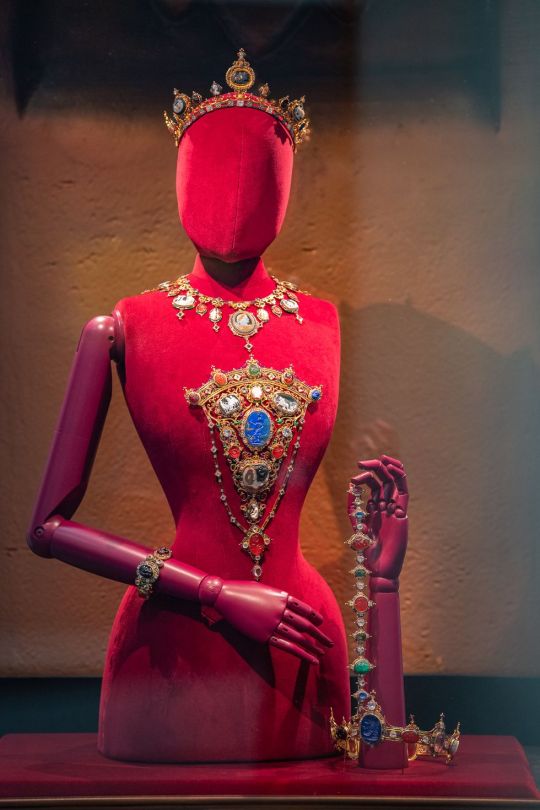
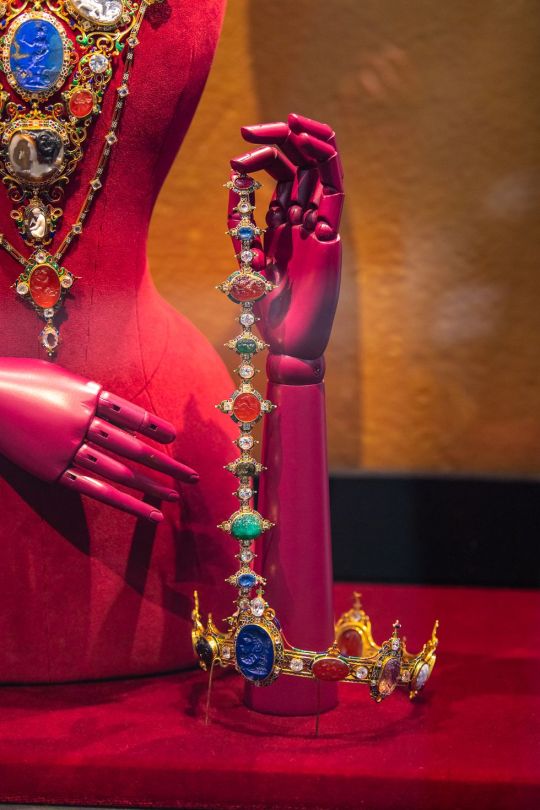
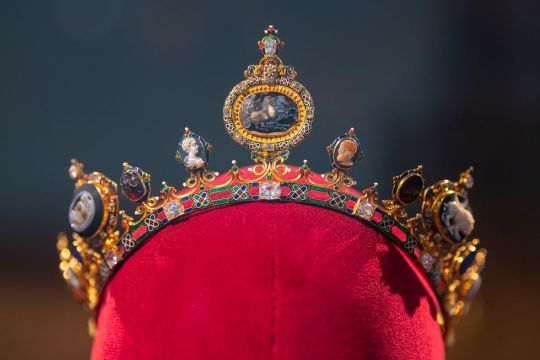
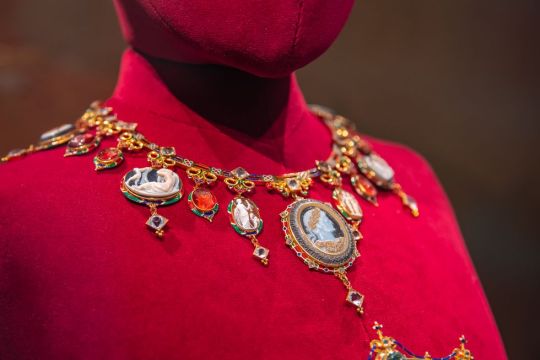
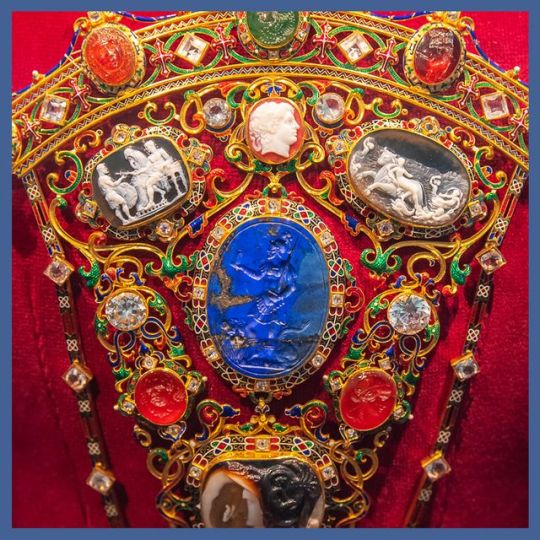
The Devonshire Parure consists of a coronet, diadem, bandeau, comb, necklace, stomacher, and bracelet. It was commissioned by the 6th Duke of Devonshire for Countess Granville, the wife of his nephew, to wear while accompanying him to Moscow for the coronation of Tsar Alexander II in 1856.
Made and designed by C.F. Hancock with input from Sir Joseph Paxton, the parure incorporates 88 cameos and intaglios from the 2nd Duke of Devonshire’s extensive carved gem collection depicting different Tudor monarchs. It includes carnelian, amethyst, garnets, emeralds, sapphires, onyx, jacinth, lapis lazuli, plasma, sardonyx and diamonds all set in gold and enamel.
The parure has been featured in Sotheby's Treasures from Chatsworth exhibit and docuseries. When not on tour, the parure is displayed at Chatsworth House, the home of the Duke and Duchess of Devonshire.
Sources: 1 2 3 4 5
#parure#set#jewelry set#jewelry collection#tiara#tiaras#diadem#diadems#coronet#bandeau#comb#necklace#brooch#stomacher#bracelet#carnelian#amethysts#amethyst#garnets#garnet#emerald#emeralds#sapphire#sapphires#onyx#jacinth#lapiz lazuli#plasma#sardonyx#diamond
315 notes
·
View notes
Text

The Marriage of Nicholas II, Tsar of Russia, 26th November 1894
Artist: Laurits Regner Tuxen (Danish, 1853-1927)
Date: 1895-1896
Medium: Oil on canvas
Collection: Royal Collection Trust, United Kingdom
Description
The wedding between Nicholas II and Princess Alix of Hesse took place in the Imperial Chapel of the Winter Palace on 26 November 1894, just over twenty years after the marriage of the Tsar's aunt in the same chapel. The wedding was announced in April that year and was to take place on the Empress Marie Feodorovna's birthday. Tragically, Emperor Alexander III died of kidney disease on 1 November, and the court was thrown into mourning with the exception of the day of the marriage.
The royal couple stand, holding lighted candles, whilst the Metropolitan Archbishop of St Petersburg, Mgr Palladius, makes the sign of the cross before them. Ella, (Grand Duchess Elizabeth Feodorovna), writing to her grandmother, Queen Victoria, described her sister's dress as 'embroidered silver cloth Russian court dress & very pretty', helpfully including a sketch. She added that 'Alix being tall will look perfectly lovely'. She wears a kokoshnik tiara and a small diamond crown, beneath which is a wreath of orange blossom, her imperial gold-embroidered mantle is lined with ermine. The Tsar is dressed in the uniform of a Hussar. In the background George I, King of Greece stands to the left of Christian IX, King of Denmark, who looks towards his daughter, the Dowager Empress; the Princess of Wales, and the Queen of Greece. The Prince of Wales can be seen dressed in the uniform of Russian Dragoons to the right of the portrait.
#painting#wedding#marriage#nicholas ii#tsar of russia#princess alice of hesee#imperial chapel#winter palace#royal couple#lighted candles#archbishop#embroidered silver cloth dress#russian court dress#kokoshnik tiara#diamond crown#orange blossom#imperial gold embroidered mantle#ermine#uniform of a hussar#george i king of greece#dowager empress#princess of wales#queen of greece#uniform of russian dragons#portrait#oil on canvas#artwork#fine art#russian history#danish painter
53 notes
·
View notes
Text
Anastasia's personality
Lesser known quotes about Anastasia Nikolaevna Romanov and her personality, from those who knew her and from Anastasia herself!
Happy reading :)
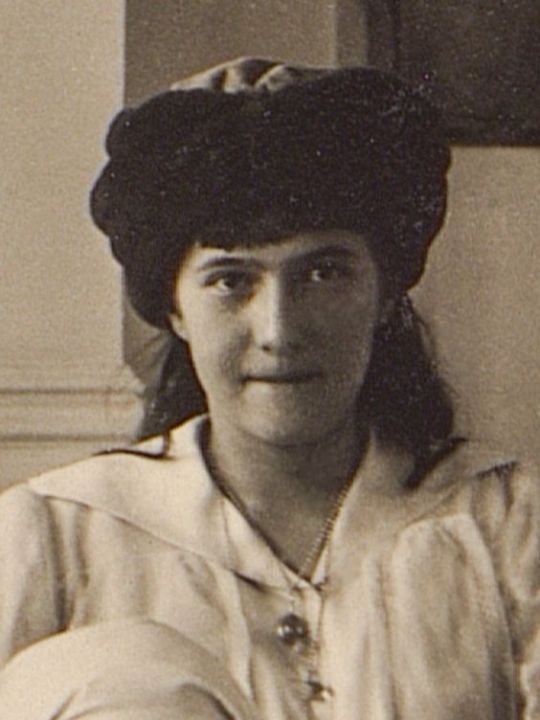
"Once they had seen this demonstration [of security dogs sniffing out objects], the Grand Duchesses often amused themselves by hiding objects on the island, and asking us to have them retrieved by the dogs. That was, above all, the favourite game of the youngest of the Grand Duchesses, Anastasia Nicholaievna. So the guide asked permission to take the Grand Duchess by the hand and let the dogs sniff it, who then disappeared into the island and brought back the hidden object. Of course, the Grand Duchess was hugely delighted." - Alexander Spiridovitch, Last Years at Tsarskoe Selo, Volume 1
Anastasia to tutor Pyotr Vasilievich Petrov: "Wikied P.V.P. I am very, very upsit with you. Why didn’t you write a litter to Maria and me? I’m telling you, you are very, very bad, extremely bad even. Maria and I have written you so meny letters and you haven’t replied. I am going to make mystakes on purpose. I alredy see where I made mystakes. Anastasia. 1909. 9 November." - Helen Azar, George Hawkins, Anastasia Romanov: The Tsar's Youngest Daughter Speaks Through Her Writings
"Sometimes, the Grand Duchesses would enter the thatched houses and strike up conversations with the peasant women. The male population worked far away, at fishing, Anastasia Nicholaievna made friends with an old peasant woman, whom she came to see in her thatched cottage several times, and with whom she had long conversations. The peasant was knitting a stocking, and showed the Grand Duchess how it was done. On her birthday, Anastasia Nicholaievna visited the old lady, and asked her how old she thought she was. When the old lady could not guess, the Grand Duchess announced proudly that she was eight years old!" - Alexander Spiridovitch, Last Years at Tsarskoe Selo, Volume 1
"We used to make long outings around the islands. One day, Anastasia Nicholaievna begged the Emperor to take her on one of these outings. The Emperor consented. It was a very long outing. We covered some fifteen to seventeen versts. Everybody, except the Emperor, was very tired, with Anastasia Nicholaievna at the point of tears. The people who accompanied the Emperor took turns carrying her pick-a-back [piggy back]. That outing was remembered for a long time." - Alexander Spiridovitch, Last Years at Tsarskoe Selo, Volume 1
"Anastasia Nicholaevna was a lively witty child, who developed rapidly in the midst of her sisters. Very mischievous, always gay she still amused herself with toys such as the little, stoppered bottles and pots which a doctor who visited the Imperial Family used to bring her. She and her brother got no end of fun from these things." - Alexander Spiridovitch, Last Years at Tsarskoe Selo, Volume 1
"Little Anastasie was delighted with the stir and bustle of city life and deeply interested in all she saw. The children developed a love for those little toy balloons which are sold in the streets. When they were very good I used to send out and get them one each. But Anastasie used sometimes to want me to stop the carriage and buy them from the men, and this, of course, could not be allowed. So I always said simply that I could not, without advancing any reason. She evidently thought force would have to be used to induce him to part with them, for one day she saw some little children walking on the Palace Quay, each one with a balloon. She drew my attention to them. "Look, look!" cried she; "little children with balloons; get out, take them from them and give them to me." I explained why that would not do, so she said, " Well, get out, and ask them nicely and politely, and perhaps they will give them to me."" - Margaretta Eagar, Six Years at the Russian Court
"Someone in speaking to me of the four little girls lately said to me, "...little Anastasie has personal charm beyond any child I ever saw."" - Margaretta Eagar, Six Years at the Russian Court
"I had got from England a preparation for the children's hair, and was rubbing it into little Anastasie's head one evening. She objected, and I said, " It will make your hair grow nicely, darling," so she submitted. Next evening I went to get the kappuka [solution] from the cupboard, and mademoiselle ran off into the next room. She returned dragging by its leg an awful dolly, a regular fetish, minus a wig, one eye, and an arm. She gravely took a little piece of sponge and began to rub the kappuka into the creature's head. I remonstrated, telling her I had to send to England for the stuff and did not want it wasted. She looked at me most reproachfully, and said, "My poor Vera! she has got no curls; this will make her hair grow." Of course, she got her way." - Margaretta Eagar, Six Years at the Russian Court
"Anastasia Nikolaevna was especially attracted to stores, where they sold doll shoes of various sizes…" - Sophia Ivanovna Tyutcheva, A Few Years Before the Catastrophe
Letter from Alexei to their father, Nicholas: "[22 Sept 1914] …Anastasia was throttling [tutor] M. Gilliard." This has also been translated as "…Anastasia was trying to strangle M. Gilliard" - George Hawkins, Alexei: Russia's Last Tsesarevich - Letters, diaries and writings
Letter from Alexandra to Nicholas: "Jan 6 1916 …Anastasia has bronchitis, head is heavy & hurts her swallowing, coughed in the night,, she writes about [Dr.] Ostrog.[orsky]. “Although he said that I look a little better than yesterday, but I am pale & my appearance is foolish in my view” just like the “Shvibzik” [her nickname] to say such things…" – Joseph T. Fuhrmann, Nicholas II and Alexandra Feodorovna. The complete Wartime Correspondence April 1914 – March 1917
Letter from Alexandra to either her brother or sister-in-law: "7 May 1913… Anastasia is growing gradually and is as funny as always." - Petra H. Kleinpenning, The Correspondence Of The Empress Alexandra Of Russia With Ernst Ludwig And Eleonore, Grand Duke And Duchess Of Hesse
The following are from Helen Azar, George Hawkins, Anastasia Romanov: The Tsar's Youngest Daughter Speaks Through Her Writings:
Tutor Pyotr Vasilievich Petrov to Anastasia: "12 October 1909. Hello dear, good, diligent, obedient (albeit not always), kind and affectionate (also not always?) Anastasia Nikolaevna!" - Helen Azar, George Hawkins, Anastasia Romanov: The Tsar's Youngest Daughter Speaks Through Her Writings
Anatoly Mordvinov to the Grand Duchesses: "September 19, 1915 My beloved torturers! I can’t express how pleased I was with your joint, dear, sweet letter… What terrible news, reported by my chief tormentor Anastasia Nikolaevna…"
Anastasia to Nicholas: "October 3rd [1915] …There was a psalm-reader who read so incredibly funny that it was simply impossible not to laugh"
Note from Anastasia to Alexei "…Now you, little piggy, know all the rooms…"
Letter from Anastasia to Alexei: "1 November 1915. ...My Dear and Darling Little Alexei! I haven’t forgotten my responsibility [to walk dog Joy], and every day either I or Madeleine or Tutles goes for a walk and it goes very well."
Last diary of Alexandra: "12/15 April. Marie comes with us [to Ekaterinburg], Olga will look after Baby, Tatiana the household & Anastasia will cheer all up." - Last diary of Alexandra Feodorovna
"Anastasia was not allowed to go to dinner, had to go to bed early, which was why she had dinner alone with the nanny in her giant lonely “upstairs”… So sad, these poor children live in a golden cage." - the memoirs of V. I. Chebotareva
Diary entry of the palace priest: "April 11, 1917 - …The former Heir was taken past my window in a wheelchair. Grand Duchess Anastasia Nikolaevna saw me in the window and loudly said to her mother, “Over there, the batiushka [father] is looking at us”" - Belyaev, Potapov, The Romanovs Under House Arrest: From the 1917 Diary of a Palace Priest
Letter from Maria to Nicholas: "April 1915 …The little Shvybzik [Anastasia's dog] just made a “governor” [accident] on Mama’s carpet, and Anastasia is not training him…" - Helen Azar, George Hawkins, Maria Romanov: Third Daughter of the Last Tsar, Diaries and Letters, 1908–1918
"...the most energetic and speedy - Anastasia Nikolaevna - had a rather silent, sedate and serious Navigator A.V. Saltanov [to look after her]. The latter ended up with most trouble and turmoil. Dear 'Nastasya', as the Gosudar [tsar] called her, was a trouble making tomboy. With her hair always messed up, always dishevelled, from morning till night she ran around the yacht, climbed up ladders, peeked where she should not have, until, with a lot of screaming she was finally led away and put to bed. Her parents said she was the "clown"." - Memoirs of Nikolai Vasilievich Sablin
"It was after Anastasia had arrived as a pupil that Gibbes met his first real problem. Still slightly built (she would soon grow rapidly), eager in her movements, her eyes sparkling with intelligence, she was self-possessed and in entire command of her features; he had met nothing like it any other child. Remembering a course in child psychology he had taken during one of his exploring periods at Cambridge, he tried as many innovations from it as he could; they did not shelter him from storms, usually sudden. Once, after a disturbed lesson, he refused to give her five marks, the maximum (and customary) number. For a moment the wondered what might happen; then, purposefully, Anastasia left the room. Within minutes she returned, carrying one of the elaborate bouquets that seemed always to be in waiting. 'Mr Gibbes,' she said winningly, 'are you going to change the marks?' He hesitated before he shook his head. Describing it long afterwards in a letter (1928) to the Grand Duke Alexander Mikhailovich, the Tsar's brother-in-law in Paris, Gibbes wrote: Drawing herself up to the most of her small height, she marched into the schoolroom next door. Leaving the door wide open, she approached the dear old Russian professor, Peter Vassilievich Petrov. 'Peter Vassilievich', she said, 'allow me to present you with these flowers'. By all the rules he should have refused them, but professors are human; he did not. Later, we made it up again, and I received my bouquets once more, for the Grand Duchess nearly always gave me one during those early years. I-well, I was more careful in my marking. We had both learned a lesson. Another morning would not be forgotten. There had been a children's fancy-dress dance at Tsarskoe Selo on the previous night. Gibbes, in tail-coat and white tie, waited at his desk for Anastasia to arrive. When she did, quickly and mischievously, her face was blackened like a chimney-sweep's and she carried a small golden ladder which she placed beside her while she waited for the lesson to begin. Gibbes, deciding to take no notice, was about to speak when he heard a rush of laughter outside the big double doors at the end of the room. They flew open, and through them there appeared the three elder Grand Duchesses with their mother. The Empress looked in horror. 'Anastasia!' she cried, 'go and change at once!' And, meekly, the sweep vanished. When she came back, her face scrubbed as red as a lobster, the gold ladder was still beside her desk; but everybody pretended not to see it and the lesson continued in the Empress's presence." - Trewin and Gibbes, Tutor to the Tsarevich
"Through the years he preserved from Tobolsk two cheap exercise books, each labelled ‘English’. ‘M. Romanof’ had written her name on one label. The other book belonged to A. Romanova (Shut Up!) Tobolsk 1917-1918.’ Grand Duchess Anastasia, more exuberantly talkative than her sisters, seized on one of Gibbes’s exasperated moments. When he told her to shut up, she asked him how to spell it and adopted it as her nickname." - Trewin and Gibbes, Tutor to the Tsarevich
"‘At the end of the farce [Gibbes reported] the husband has to turn his back, open his dressing-gown as if to take it off- Anastasia wore an old one of mine - and then exclaim: 'But I've packed my trousers; I can't go.' The night's applause had excited the little Grand Duchess. The piece had gone with a swing and they were getting through the 'business' so fast that a draught got under the gown and whisked its tail up to the middle of her back, showing her sturdy legs and bottom encased in the Emperor's Jaeger underwear. We all gasped; Emperor and Empress, suite and servants, collapsed in uncontrolled laughter. Poor Anastasia could not make it out. All were calling for a second performance, but this time she was more careful. Certainly I shall always remember the night; it was the last heart unrestrained laughter the Empress ever enjoyed.’" - Trewin and Gibbes, Tutor to the Tsarevich
"...Anastasia was the most amusing; she was always full of mischief. - “Anastasia is our family clown!” the Emperor once exclaimed, laughing, to my mother." - Olga Voronova, Upheaval
"Fleeting memories come back to me of those cloudless summer days. Pictures of the Emperor and his daughters at the Garden Party at Tsarskoe, the little Grand Duchess Anastasia, her cheeks scarlet with excitement, surrounded by a group of midshipmen, plying them with eager questions. “You will take me up into your conning tower,” her clear childish voice rang out above the hum of conversation. “Couldn’t you let off one of the guns and just pretend it was a mistake?”" - Muriel Buchanan, Ambassador's Daughter
"The youngest girl, Anastasia, was spirited, sly and playful; she would get under the dinner table and pinch the legs of some elderly statesman until her father pulled her out by her hair. She has been described as ���a little inextinguishable volcano, with a world of her own’." - Bernard Pares, The Fall Of The Russian Monarchy A Study Of The Evidence
"The Tsar's youngest daughter was much the sprightliest and most entertaining. She had a comic gift as a mimic, picking out people's foibles in a way that made everyone laugh. "What a bundle of mischief," recalls her godmother, Grand Duchess Olga Alexandrovna, the Tsar's sister. There was also a serious side to Anastasia's nature. She had a restless, questioning intelligence. "Whenever I talked with her," says Count Grabbe, "I always came away impressed by the breadth of her interests. That her mind was keenly alive was immediately apparent." More than her sisters, Anastasia chafed under the narrowness of her environment and used her comic sense in revolt against it." - Count Alexander Grabbe, The private world of the last Tsar, in the photographs and notes of General Count Alexander Grabbe
"The Grand Duchess Anastasia Nicholaevna was sixteen or seventeen years old; she was short, stout and was, in my opinion, the only one in the family that appeared to be ungraceful Her hair was of a lighter color than that of Maria Nicholaevna. It was not wavy and soft, but lay flat on the forehead. Her eyes were grey and beautiful, her nose straight. If she had grown and got slim she would have been the prettiest in the family. She was refined and very witty. She had the talents of a comic actor, she made everybody laugh, but never laughed herself. It appeared as if her development had stopped and, therefore, her capacity faded a little. She played the piano and painted, but was only in the stage of studying both." - The Examination of Sidney Gibbes, The Last Days of the Romanovs
"The Grand Duchess Anastasia, I believe, was seventeen. She was over-developed for her age; she was stout and short, too stout for her height; her characteristic feature was to see the weak points of other people and to make fun of them. She was a comedian by nature and always made everybody laugh. She preferred her father to her mother and loved Maria Nicholevna more than the other sisters." - The Examination of Commissar E. S. Kobylinsky, The Last Days of the Romanovs
Hope you enjoyed reading and learnt something new!
Want to find a book listed here? Reply, ask, or message me! I'd be happy to help!
#Anastasia Romanov#Anastasia Nikolaevna#Anastasia#sources#Romanov#Romanov sisters#Romanov family#Grand Duchess Anastasia#women's history#Anastasia 1997#russian history#history
225 notes
·
View notes
Text
every time I try to make some sense of the franco-russian alliance of 1807-1812 I’m losing my mind because it goes like
historian 1: from the very beginning tsar Alexander decided to use his charm to fool Napoleon and merely pretended to be his ally to win some time, much needed to prepare a new Coalition. We can see his distrust clearly from his correspondence.
historian 2: from the very beginning Napoleon decided to use his charm to fool Alexander and manipulated his ambitions to win some time, much needed to secure a peace with England. We can see the tsar’s excitement clearly from his correspondence.
historian 3: Napoleon and Alexander never actually trusted one another and the whole alliance was a ruse based on mutual flattery and empty promises so that the two great powers could prepare for a new war. We can see this animosity clearly from their correspondence.
historian 4: Napoleon and Alexander were mutually charmed and developed a deep intimate friendship that was sullied by obligation and political intrigue. We can see their sincere attachment clearly from their corres-
#like i GET IT there’s a LOT of their correspondence to and about each other but could you be a bit less selective?#napoleon bonaparte#tsar alexander i#napoleonic wars#alexander i of russia#history#remember I posted about academic bias? well there’s a TON of that
216 notes
·
View notes